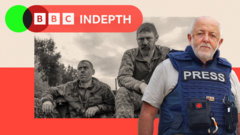Three years after the onset of a brutal conflict, Ukraine is confronting renewed fears of existential threats as political dynamics shift in the United States. Once a city echoing the horrors of war, Kyiv now bustles with daily life, yet ominous developments unravel amidst soaring tensions. On 12 February, a controversial phone call between former President Donald Trump and Russia’s Vladimir Putin seems to have reignited Ukraine's nightmare—the threat of national extinction.
Where once Ukrainians were primarily concerned about the constraints imposed by President Joe Biden on military aid, the discourse has shifted dramatically. Trump, noted for his bombastic and often inflammatory rhetoric, has cast doubt on Ukraine's right to sovereignty. By labeling President Volodymyr Zelensky a dictator unworthy of negotiation, he dismisses Ukraine’s plight, suggesting instead that the nation bears responsibility for the war—a narrative that aligns disturbingly with Russian propaganda.
In response to Trump's calls for concessions, which include disallowing NATO membership for Ukraine and accepting the annexation of Ukrainian territories by Russia, the pressure on Kyiv intensifies. Veteran diplomats worry that Trump's negotiating stance, eager to appease Moscow before meaningful discussions even begin, sends a chilling message of weakness to Putin, whose demands continue to escalate.
In Kyiv, senior adviser to President Zelensky, Ihor Brusylo, paints a picture of resilience amid adversity, emphasizing their steadfast commitment to maintaining sovereignty. "We live in challenging times again," he stated, evoking memories of the initial invasion's chaos, underscoring determination to remain part of Europe.
Notably, the haunting memories of February 2022 are still fresh for Ukrainians. As artillery fire echoed in the streets and barricades rose across Kyiv, civilians fled, fearing for their lives. Today, maintainingsuccessful daily life amidst persistent missile threats has become a challenging normalcy.
While Trump’s return to power could amplify fears of a rapprochement with the Kremlin, Ukrainians have demonstrated immense capacity and resolve in past conflicts, shifting from panic to strategy. Their military evolution includes a significant uptick in domestic weapon manufacturing, crucially aided by Western technology.
Amidst the fight, narratives of sacrifice emerge as young volunteers confront the grim realities of armed conflict, drawing painful comparisons to historical appeasement moments where aggressors were emboldened. The palpable fear is that, much like the lessons of the past, a renewed U.S. posture may undermine the principles of sovereignty that nations hold dear.
As Ukraine stands on the precipice of another potentially devastating confrontation, its defenders remain resolute. With military engagements intensifying along the 1,000-kilometer frontline, there is an urgent call for Western policymakers to reassess strategies toward both Kyiv and Moscow, lest recent sacrifices be in vain. For Ukraine, the stakes have never been higher; preserving independence remains a fight that stretches far beyond the battlefield.




















